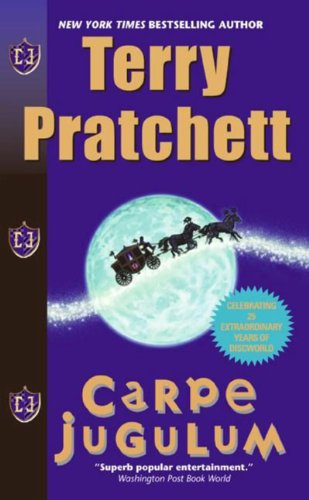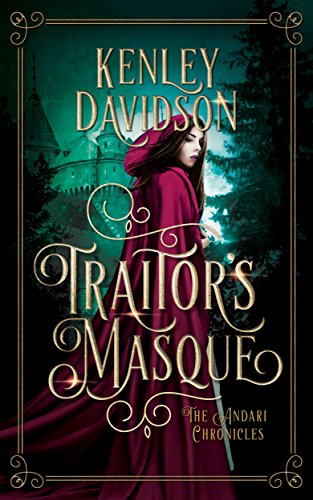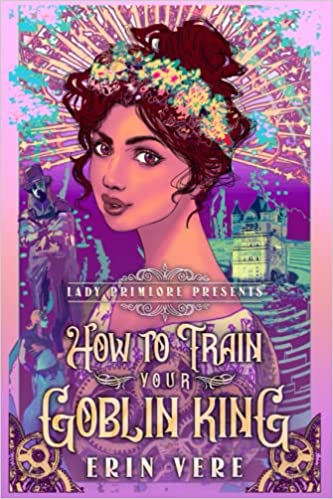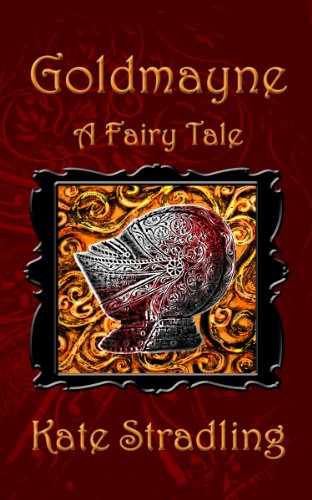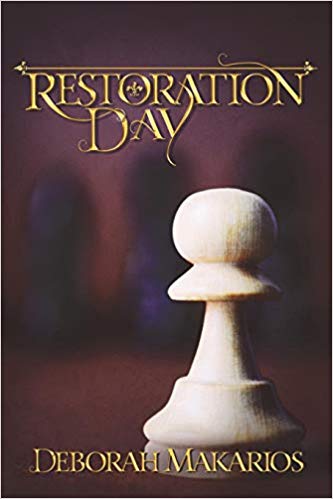It is rare and splendid event when an author is elevated from the underground into the international literary establishment. In the case of England’s best-known and best-loved modern satirist, that event has been long overdue.
Terry Pratchett’s profoundly irreverent Discworld novels satirize and celebrate every aspect of life, modern and ancient, sacred and profane. Consistent number-one bestsellers in England, they have garnered him a secure position in the pantheon of humor along with Mark Twain, Douglas Adams, Matt Groening, and Jonathan Swift.
Even so distinguished an author as A. S. Byatt has sung his praises, calling Pratchett’s intricate and delightful fictional Discworld “more complicated and satisfying than Oz.”
His latest satiric triumph, Carpe Jugulum, involves an exclusive royal snafu that leads to comic mayhem. In a fit of enlightenment democracy and ebullient goodwill, King Verence invites Uberwald’s undead, the Magpyrs, into Lancre to celebrate the birth of his daughter. But once ensconced within the castle, these wine-drinking, garlic-eating, sun-loving modern vampires have no intention of leaving. Ever.
Only an uneasy alliance between a nervous young priest and the argumentative local witches can save the country from being taken over by people with a cultivated bloodlust and bad taste in silk waistcoats. For them, there’s only one way to fight.
Go for the throat, or as the vampyres themselves say…Carpe Jugulum
Carpe Jugulum was written by the late Sir Terry Pratchett in 1998. As with many novels, it is in part a satire: both of a contemporary trend toward gothic horror in fantasy and popular culture, and of literature and popular culture featuring vampires.
So it’s both a relatively old novel, and it’s about vampires, which are dark and scary. Why am I reviewing it now for a site focusing on noblebright fiction? C.J. Brightley hatched an idea for a series of reviews focusing on the intersection of noblebright and mainstream fantasy, and I couldn’t think of a better place to start than with the work of Terry Pratchett–and Carpe Jugulum is a particular favorite of mine. It takes a theme present in many of his novels, and one that’s also important in noblebright fantasy, and develops it substantially: what is power, who has it, and what ought to be done with it?
The novel begins fairly simply: a family of vampires is invited to the slightly mountain kingdom of Lancre, where they plan to usurp the throne and take over. Their glamour ensures everyone finds this acceptable, except for the local quartet of witches and a priest (who, rather crucially to both his character and the plot, happens to be in the midst of a crisis of faith).
Granny Weatherwax, the most senior of the witches, can’t see a way to win, and initially refuses to get involved. When she finally does, she’s attacked, apparently turned into a vampire, and left for… undead.
It’s hard to call any of Pratchett’s Discworld novels truly dark: puns and the occasional double entendre abound, and this point his fans must be fairly certain nothing truly world-ending will happen to his major characters. Nevertheless, at this point things look fairly dire. Two of the witches flee Lancre with an infant in tow, one is taken captive by the vampires in an attempt to convince her their modern lifestyle is the way of the future, and Granny Weatherwax is left in the care of the priest–whose instructions, in no uncertain terms, are to find out who she is when she wakes up, and kill her if she’s anything other than human.
And it’s at this point, I think, that Carpe Jugulum makes it onto the list of noblebright fantasy novels. Here, against the shifting background of a number of typically Pratchett characters acting out typically Pratchett scenes, Granny Weatherwax wakes up. And in the company of the rather atypical character of the priest, Mightily Oats, she works her way toward the home of the vampires.
Oats is at war with himself. He is uncertain what his faith is for; he knows the words for what he does, but he suspects that what he’s doing with his life has no purpose. Granny Weatherwax is the avatar of purpose, but she’s as weak as Pratchett’s audience has ever seen her–indeed, and entirely uncharacteristically, she spends most of the novel doing nothing except walking and riding.
Oats isn’t entirely happy about this, or to be honest even a little bit happy, but at least it’s a clear purpose: one does not, after all, leave sick old women to walk down mountains in the rain alone. Even if they are stubborn and irascible, and possibly especially then.
Together, they have an almost Socratic dialogue. Here’s the heart of it, from Granny Weatherwax:
“‘That’s people for you. Now if I’d seen [the god Om], really there, really alive, it’d be in me like a fever. If I thought there was some god who really did care two hoots about people, who watched ’em like a father and cared for ’em like a mother… well, you wouldn’t catch me sayin’ things like “There are two sides to every question,” and “We must respect other people’s beliefs.” You wouldn’t find me just being gen’rally nice in the hope that it’d all turn out right in the end, not if that flame was burning in me like an unforgivin’ sword. And I did say burnin’, Mister Oats, ‘cos that’s what it’d be. You say that you people don’t burn folk and sacrifice people any more, but that’s what true faith would mean, y’see? Sacrificin’ your own life, one day at a time, to the flame, declarin’ the truth of it, workin’ for it, breathin’ the soul of it. That’s religion. Anything else is just… is just bein’ nice. And a way of keepin’ in touch with the neighbours.’
She relaxed slightly, and went on in a quieter voice: ‘Anyway, that’s what I’d be, if I really believed. And I don’t think that’s fashionable right now, ‘cos it seems that if you sees evil now you have to wring your hands and say, “Oh deary me, we must debate this.” That’s my two penn’orth, Mister Oats. You be happy to let things lie. Don’t chase faith, ‘cos you’ll never catch it.’ She added, almost as an aside, ‘But, perhaps, you can live faithfully.'”
Mightily Oats, at the end of the story, acts. At a pivotal moment, he is able to set aside his doubt–not in religion, which was never his problem, but in himself–and destroy one of the vampires. It’s not entirely Granny Weatherwax’s fault that he can do it, but she helps arm him, and she helps him remember when the time comes that he’s the kind of person that can choose to act even in the gravest of circumstances.
Of course, we all are.
Many of the novel’s characters fundamentally dislike Oats, but it’s clear that he earns Granny’s respect, and it’s also clear that the narrative respects him. His fundamental decency is shown to be inexperienced (especially by comparison to Granny Weatherwax), but not foolish. His act, or rather acts, of patient sacrifice are central to the novel. And his courage is critical to the novel’s resolution.
At its best, I think this is what fantasy can do. It doesn’t need to pretend that the world is perfect; in fact, it should reflect that the world contains monsters. But fantasy–noblebright fantasy–helps remind us that our virtues aren’t wasted on each other, or in the world. It reminds us that destroying the monsters is important, but so is helping each other walk, and most of the time walking together comes first.
This book review was written by Robert McCowen.

